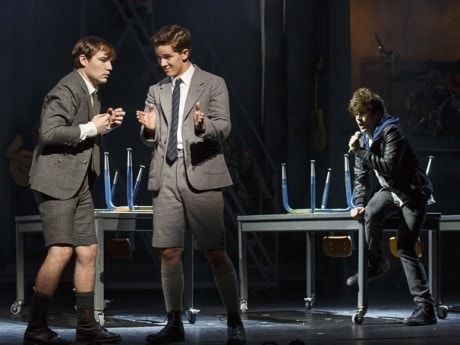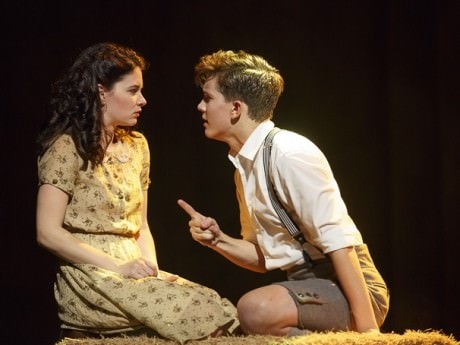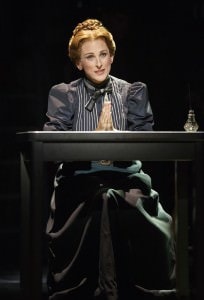Some time between 1890 and 1891 Frank Wedekind managed to complete a play in his native German, which contained all sorts of forbidden fruits. It dealt with adolescence, puberty, sexuality, rape, child abuse, homosexuality, abortion, suicide — all set in a time when silence on all of them was in fashion. As the play begins, Wendle Bergmann, a young girl of 13 is questioning her mother about her inner stirrings, and her mother’s inability to help her understand the beginnings of her sexuality sets the girl on a path that leads to a terrible ending.

Wendle feels attraction for a boy in her community, Melchior Gabor, who is almost 15 — an affable atheist whose school record is impeccable, a boy who is popular with everyone — the apple of his mother’s eye, the leader of his pack of school chums, the eye candy for all the girls in town. His best friend, Moritz Stiefel, is a boy so traumatized by puberty he can’t concentrate on anything. He works hard and is thrilled to pass the mid-term exams, but fear returns that he will never make it to the end of the term. He can’t find help anywhere, except from a wayward girl named Ilse, but he’s too far gone to pay much attention. He sees only darkness ahead, his fate is sealed.
Much happens to these teenagers, and though we’ve seen and heard many stage works dealing with the coming-of-age syndrome, I can’t think of one that lays tragedy upon tragedy as adroitly as does this tale of a hypocritical and repressive society. Melchior and his girl, responding to the urgent craving they have for each other, consummate the relationship, and Wendle, without understanding what’s happened to her, is pregnant.

An essay Melchior had written for his friend Moritz to help him understand what sexual expression is supposed to be about, is discovered, and all hell breaks loose. The ending is pre-ordained, and the play ends tragically as a late nineteenth century version of Romeo and Juliet and other tales of star crossed lovers.
It was Steven Sater, playwright, who chose it to serve as the source for a musical version, of which he was to write book and lyrics. He took it to composer Duncan Sheik who, in 1999, was just beginning to explore musical theatre. He and Sater had talks, but Sheik did not like musical theatre as it was then being created. “One minute the characters are talking, then they are singing, and then they are talking again.” Sater convinced him they could come up with a score in which there would only be interior monologues set to music, songs in which the characters’ inner thoughts would be revealed. From the beginning, they conceived Spring Awakening as both musical theatre and a pop/rock album. They felt that this was where young people could express the longing that is everywhere in Wedekind’s play. This recipe could well have resulted in a flat soufflé but it didn’t. It took seven years, until 2006, for the finished work to find a proper stage, and they give full credit to Michael Mayer, the director, who was a late addition to the creative staff. He helped them shape it into a satisfying, visceral, and viable theatre musical. It opened off Broadway, was moved to the Main Stem, and enjoyed a long and profitable run.
And here we are, only seven years since that production closed, welcoming it once again, in a production launched at the Deaf West Theatre in Los Angeles. The brain child of director Michael Arden, it was translated into American Sign Language (ASL), working with deaf actors in a careful process that adhered to the script as written while preserving the integrity of ASL. Ultimately, six actors from this group were integrated into a company of 25 — six of the principal roles are now being played by them, shadowed by a second actor who speaks the words or sings the lyrics. I believed that would never work, but it does! If anything, it seems to make the piece more universal, for one of its underlying themes is the need for communication, certainly between parents and their children, between priests and their flock, and now between hearing and non-hearing human beings.In the ensemble numbers, the entire company sings and signs simultaneously so anyone deaf out front will “hear” everything.
Michael Arden and his Choreographer Spencer Liff have arranged a simple set, a brilliant lighting design, and stage movement that is inventive, startling and very useful in moving the long and complicated story forward. The role of “Melchior” once helped launch the career of Jonathan Groff, and it will do so once again with Austin P. McKenzie, who brings youth, good looks, a fine voice and total delivery of all of Melchior’s charismatic qualities.
Andy Mientus is returning to the role of “Hanschen,” which he played in the national tour of Michael Mayer’s company. Most of his singing is done in the company of others, but his big scene late in the play with Joshua Castille as “Ernst,” has him in full command. If you keep your eye on him throughout the evening, he is always in character, he moves well. His character is bright, shrewd, always in control. He gets what he wants, and he knows how to avoid anything and anyone that stands in his way. This young actor, who just completed a year’s run as Marius in Les Misérables on Broadway, has yet to find the role that will catapult him to the top of the heap, but it will come. We worked together five years ago in such a situation, but that project, a workshop with him in the lead role, has not yet been fully realized. Mientus won an award at NYMF for his performance, which he certainly deserved.
Marlee Matlin is making her Broadway debut as Melchior’s mother, and other roles. An Oscar winner for her performance in Children of a Lesser God, she has spent much of the time since then in other films, and raising four children with her husband.

Patrick Page, a fine character actor who won awards as the “Green Goblin” in Spider Man on Broadway, also made a super Baron de Guiche in the last revival of Cyrano de Bergerac, He is always welcome as he brightens any season in which he appears. Daniel Durant, one of the company from Deaf West, is a most appealing Moritz. The entire company works hard, and well.
The score serves the story, and is deserving of further study. “The Bitch of Living” and “Totally Fucked” certainly make their mark, and “The Word of Your Body” is moving and effective. The rock sound in the score, and the nineteenth century attitudes in the story make an effective and powerful cocktail.
The audience, refreshingly young for Broadway, did a lot of hootin’ and hollerin’, and you know what? So did I.
Running Time: Two hours and 20 minutes, including one intermission.
Spring Awakening is playing at The Brooks Atkinson Theatre – 256 West 47th Street, in New York City. For tickets, purchase them at the box office, call (877) 250-2929, or purchase them online.





